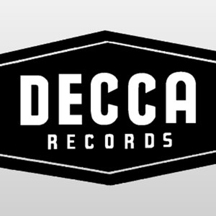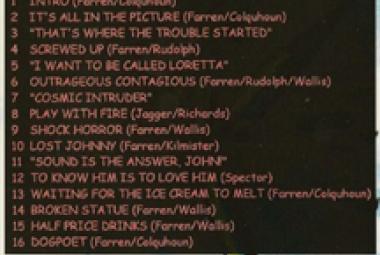Decca Records began as a British record label established in 1929 by Edward Lewis. Its U.S. label was established in late 1934 by Lewis along with American Decca’s first president Jack Kapp and later American Decca president Milton Rackmil; however, owing to World War II, the link with the British company was broken for several decades. The British label was renowned for its development of recording methods, while the American company developed the concept of cast albums in the musical genre. (More from Wikipedia)
A native of Lubbock, Texas, Buddy Holly initially began performing with his childhood friend Bob Montgomery under the name Buddy and Bob, calling their musical style “western and bop”; they were the opening act for Elvis Presley when he performed in the Lubbock area in 1955. In February 1956, Holly was signed by Decca Records but found the recording environment confining, where he was allowed virtually no input. Buddy Holly was dropped by the label in January 1957 but was still bound by his contract that forbade him to re-record any songs during his stint with Decca for five years, regardless of whether or not they had been released.
Buddy Holly and his band – by now known as the Crickets (they noticed crickets chirping in the studio one time while they were recording, or so the film The Buddy Holly Story maintains) – then began working at Norman Petty’s studio in New Mexico, concentrating in particular on what they considered their strongest song, “That’ll Be the Day” that they had never been able to satisfactorily record in the Decca studios. The recording was brought to the attention of Bob Thiele, an executive at Coral Records; though Thiele liked it, others at Coral were unenthusiastic.
Nevertheless, in March 1957, the Crickets signed with Brunswick Records. In order to avoid problems with Decca Records – even though Brunswick was a Decca subsidiary – Buddy Holly was not listed as a member of the Crickets on the original recording contract. Not surprisingly, this would create serious legal and financial problems for Buddy Holly in the future.
According to Norman Petty, “That’ll Be the Day” by the Crickets was released in May 1957 to “humor” Bob Thiele. The song became a #1 hit that summer; and before long, the jig was up as Decca Records executives realized that Buddy Holly was their bandleader. However, as Cyndi Lauper observed in her 1984 hit song, “Money Changes Everything”, so Decca Records released Buddy Holly from his original contract restriction. As a condition though, Buddy Holly was signed individually to Coral Records (yet another Decca subsidiary); thus, Buddy Holly was in the unusual position of being bound by two recording contracts at the same time – his earlier contract as a member of the Crickets and this new one as an individual artist.
Holly released just three albums during his lifetime, all under different names: The Chirping Crickets by the Crickets on Brunswick Records in 1957; Buddy Holly by Buddy Holly on Coral Records in 1958; and That’ll Be the Day by Buddy Holly & the Three Tunes on Decca Records, also in 1958. The latter album was an attempt by Decca to cash in on Holly’s fame by releasing the songs from Buddy Holly’s 1956 studio recordings from his original contract with Decca.
(June 2013/1)
* * *
After auditioning the Klubs at a nightclub called the Pink Flamingo, Vic Smith signed them to a management deal with Don Arden’s company Aquarius. As a result, in early 1968, the Klubs again sort of followed in the Beatles’ footsteps and arrived at Decca Records – actually, Decca had famously decided against signing the Fab Four – where four tracks were laid down according to company records. Two were covers of the Beatles’ “Drive My Car” and Jimi Hendrix’s “Fire” – the latter song (apparently recorded at a later time) is the only cover song on the Midnight Love Cycle CD – plus their own songs “Midnight Love Cycle” and “Ever Needed Someone”. “Midnight Love Cycle” also became the title of their retrospective albums.
* * *
Don Arden insisted that the Klubs change their name to Revolution – perhaps he got the idea from another single by Tomorrow called “Revolution” that came out the year before the song of that name, “Revolution” by the Beatles. When the band refused to bow to this demand and arrogantly stood their ground, Arden heaped abuse on the young bandmembers. Don Arden, who was once called “the Al Capone of pop” by critic Johnny Rogan, was not used to taking any lip from the bands that he signed; Arden tore up their recording contract in front of the Klubs and vowed that their Decca recordings would never see the light of day.
* * *
Other songs that were recorded by the Klubs in that session are another psych killer “Indian Dreams” – three very different versions of this song are also included on the Midnight Love Cycle CD – and an R&B song called “Oh Baby”. The “A” side of the first single, “I Found the Sun” is a bit tamer but has the same wyld guitar work, soaring harmony vocals and fine songwriting that mark all of the band’s work. This song is backed on the 45 with “Ever Needed Someone”, a re-recording of one of their earlier Decca tracks, which has more of an old-school Merseybeat feel. Despite the aforementioned ad in New Musical Express, the fledgling Cam Records label could only place the single at local record stores in Liverpool, where sales were minimal.
(July 2013)
* * *
Small Faces had a rocky start with Decca Records but eventually began working under one of England’s top producers, Andrew Loog Oldham – who had worked with the Rolling Stones, Marianne Faithfull, and others – and signed them as the top act on his new company, Immediate Records. Their first album with that label, Small Faces – a self-titled album like their debut effort with Decca, Small Faces – was an instant hit in mid-1967 and included a song that even made the charts in the U.S., “Itchycoo Park”.
(April 2014)
* * *
Kim Fowley always wanted to be where the action was, so he relocated for a period of time to London by late 1963. One of the first fruits of his sojourn there might have been a rollicking cover version by Bo and Peep of the Sonny James/Tab Hunter romantic ballad “Young Love” that was released on Decca Records in 1964 not long after Fowley arrived in the UK. The long-time Rolling Stones producer Andrew Loog Oldham was on hand, and it is clear from the record that the studio was jammed with people. Rumored to be among those participating in the recording are Mick Jagger (and perhaps other Stones), Gene Pitney and Kim Fowley. The song is included on the Pebbles, Volume 6 LP and the English Freakbeat, Volume 6 CD.
(January 2015/1)
* * *
Anyway, Mick Jagger was about the only member of the band who was generally well known by name among the kids that I knew, with Keith Richards less so. Actually he wasn’t even Keith Richards in the early part of the band’s history; as explained in Wikipedia: “After the Rolling Stones signed to Decca Records in 1963, their band manager, Andrew Loog Oldham dropped the ‘s’ from Richards’ surname believing ‘Keith Richard’ in his words ‘looked more pop’. In the early 1970’s, Richards re-established the ‘s’ in his surname.”
* * *
Just a couple of years ago, I finally found out what was going on when I read the discussion by Richie Unterberger in Allmusic about the differences between the American and the English releases of the first Stones album: “[T]he main difference lies in the version of ‘Tell Me’ included here, which sounds about two generations hotter than any edition of the song ever released in the U.S. – it’s the long version, with the break that was cut from the single, but the British LP and the original late-’80s Decca U.K. compact disc (820 047-2) both contain a version without any fade, running the better part of a minute longer than the U.S. release of the song, until the band literally stops playing.” Apparently that DJ had gotten his hands on a copy of the British version of the song, and I was fortunate enough to hear it that one time at an impressionable age.
(May 2015)
* * *
“Hello Little Girl” was included on the Decca Records audition tape; there is also a home demo recording of the song that features Stuart Sutcliffe on bass guitar, which is currently available only on bootleg albums. A version of “Hello Little Girl” by the Beatles is included on Anthology 1.
(June 2015)















